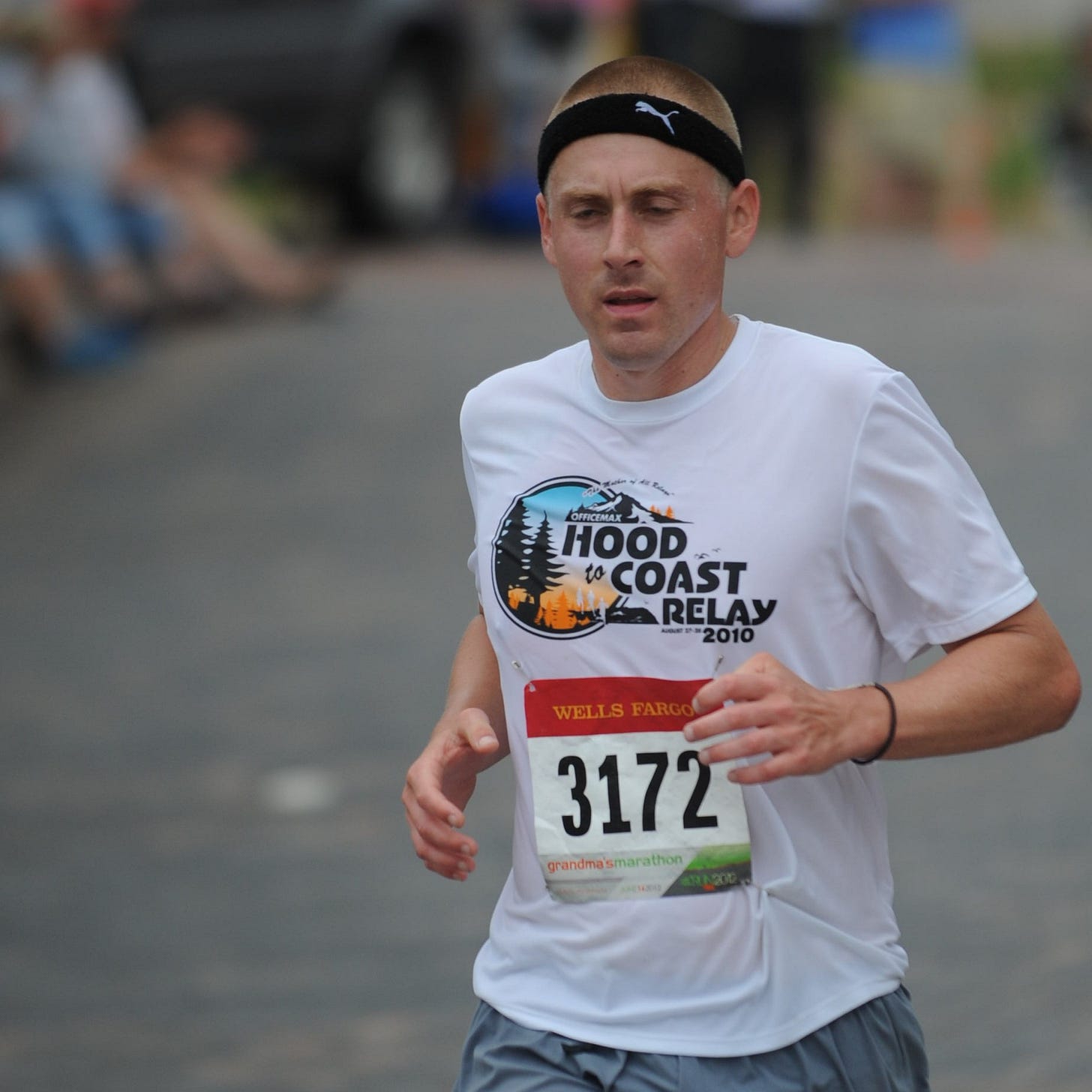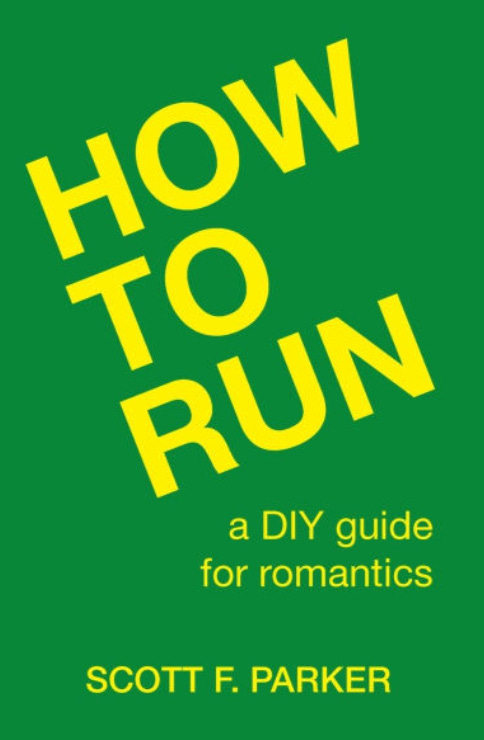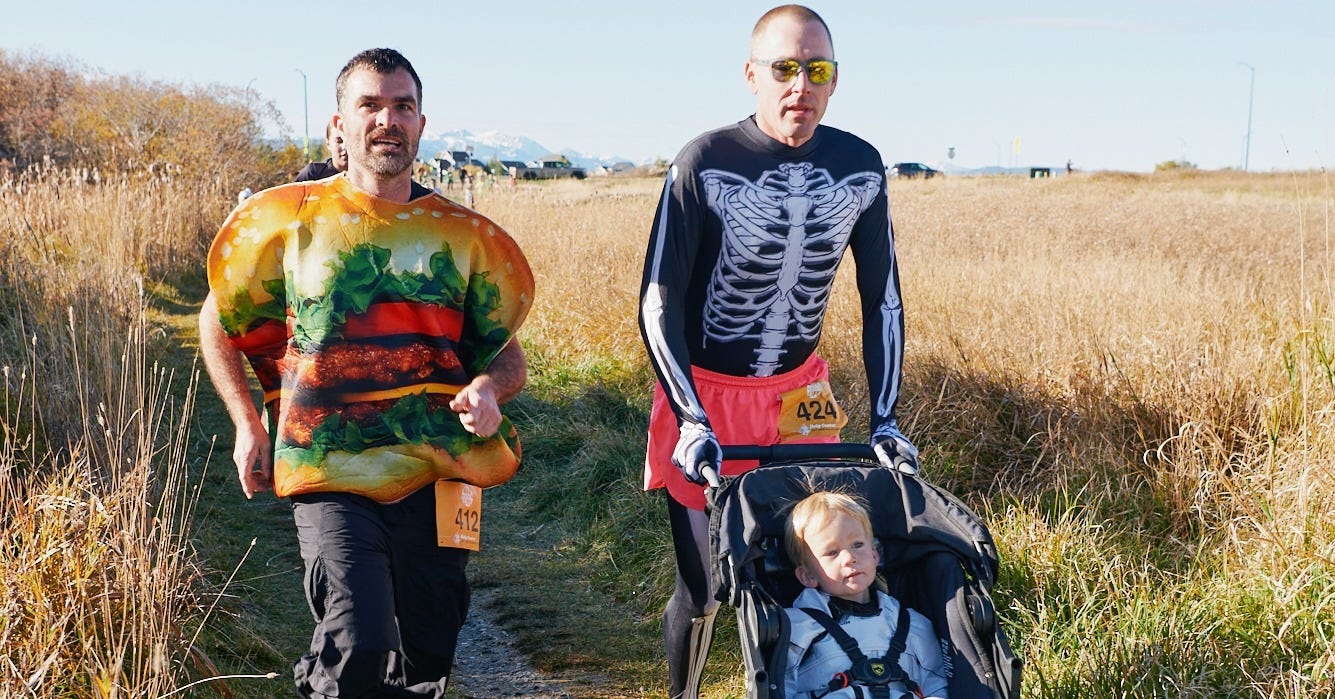How to run?
Entangled in that question are multitudes. There’s the performance angle: how to effectively focus your effort for improvement, how to maximize health benefits, how to best your competitors.
There’s also a deeper line of inquiry—asking ’how to run’ can explore running as a practice or way of being. Is running a means to some productive end? Is it just a race time? Or is it an activity that is itself valuable beyond any specific goal? Can running be something more human, more spontaneous, and wise?
These questions are central to the writing of Scott F. Parker, author of several books, including The Joy of Running qua Running and Run for Your Life: A Manifesto.
Parker’s latest book, How to Run: A DIY Guide for Romantics, assembles a series of short essays, meditations, and poems that put aside concerns about running faster or longer.
Instead, Parker explores how we inhabit the activity of running and why it is spiritually and philosophically important. He wants us to consider our sense of delight and wonder in movement; how might we run for the sake of the run?
I received an advanced copy before the book’s release next month. It’s a gorgeous little tome, essential reading for anyone interested in the spiritual and philosophical side of sport.
“I fully admit to being the kind of runner who romanticizes the sport, at least when it is practiced outdoors, where you can find me communing with nature, confronting the sublime, or struggling heroically against my limits—you name it, and I’ll be there trying to have a moment.” —Scott F. Parker
Scott was kind enough to let me ask him a few questions about the book. He and I share some common thinking (and also some disagreement) which we get into below. I learned a lot!
How to Run will be released on June 17 and is available now for pre-order on Barnes & Noble and Amazon.
1) Let’s start at the beginning. Your subtitle for the book is “A DIY Guide for Romantics.” Who are the romantics you’re addressing with this collection, and what are you hoping they take away from it?
SP: It’s not as pithy, but a more accurate subtitle would probably be something like “A DIY Guide for Approaching Running as a Romantic Might.” Except, of course, that’s not all that accurate either, since this is hardly a DIY guide in any traditional sense but only insofar as my testimony is persuasive or, possibly, inspiring.
What do I mean by all that? In short, something like: when it comes to running, experience—subjective experience, if that isn’t redundant—is the standard we should orient by. Which is just a fancy way of saying “Run for fun!” The way I see it, life is short, and the instrumental reasons for running aren’t very good, whereas the argument for running because it makes you feel pretty much fully alive is irrefutable.
2) Running is often held up as a thing in itself: a sport, a practice, a hobby. Your essays complicate, or at least play with, that separation of concept from experience. This is from your essay "Phenomenology of Running":
“Running, like anything, is inscrutable but from a distance. To scrutinize is to apply language, to chunk experience, to impose stases on dynamic processes. That is, it takes us from running to ‘running,’ from experience to concept.”
One way you complicate this distancing of concept from experience is noting the deep corporeal nature of running:
“Not embodiment, just bodiment. / It’s not enough to listen to the body; you must be the body. For the runner, the body is how the distributed mind thinks.”
Could you elaborate on some of the threads you’re pulling at here? What led you to think about running in terms of concept vs. experience vs. sensation?
SP: There are so many ways I could respond here. I guess the first thing to say is that I’m a kind of mysterian in that I don’t hold any hard-and-fast positions about the metaphysics of what it means to be human. That said, it doesn’t seem to me that the mind is just something the body does. So I’m not a materialist, but neither am I a dualist. Whatever the relationship between mind and body is, it’s much closer than dualists used to contend (correct me, but I can’t remember the last time I heard from a genuine dualist).
I’m not someone who could do the greatest job of arguing for these intuitions in a philosophically rigorous way, but I am someone who has noticed that running suggests a deep entanglement (maybe a union?) of mind and body. I bet any runner, or any athlete for that matter, has noticed the intelligence of the body—the memory, the creativity, the wisdom. Whatever the human being is, it is a being capable of thought and movement. It makes sense to me that these two activities, like every activity we participate in, are expressions of the human, and I’m not very inclined to draw distinctions through the heart of human expression. In other words: we think with our legs just as we run with our brains. In part, that is.
3) You reference philosophers like Wittgenstein and Nietzsche throughout the essays, along with nods to Zen. I’d love to learn more about the thinkers you’re drawing from in the book. How have they informed your thinking? Are there particular philosophical ideas you see as central to the book?
SP: For starts, I have found Nietzsche’s caution against ideas that don’t come while walking to agree with my experience of running. Most of How to Run comes directly out of runs I’ve been on over the last seven or so years. From there, I take them as they come, which means the philosophers and philosophies I engage are those that bounce most reliably and idiosyncratically through my mind.
In addition to Nietzsche and Wittgenstein, the most pronounced influences are probably Chuang Tzu, Zen, Basho, and Alan Watts, with Aristotle’s ethics kicking around in there somewhere.
If you squint a certain way to get your eyes to work like mine, the common philosophical theme you’ll notice is a kind of broad naturalism in which one flourishes by doing what is true to one’s nature or, in Nietzsche’s expression, becoming who one is. I don’t think it would be wrong to say that the book is really a working out of some of the myriad implications of that seemingly simple goal. Although, hearing how that sounds, I hasten to add for anyone who hasn’t read the book that it’s nothing so systematic as that. The book is really a collection of the kinds of stories and thoughts that visit anyone who pays attention to what running feels like.
“I bet any runner, or any athlete for that matter, has noticed the intelligence of the body—the memory, the creativity, the wisdom. Whatever the human being is, it is a being capable of thought and movement.”
4) You explore the tension between telic and atelic experience—between doing something for an end versus doing it for its own sake. I think we might see that tension a bit differently, so I’d like use a short story to frame my question:
I set my personal best in the marathon back in 2018, after a training build-up of nearly two years. It remains the most well-executed race I’ve ever run, the culmination of a decade spent trying to figure out the distance.
Afterward, standing in the hotel shower, I felt a deep sadness as the warm water poured over me. Because now it was over, this consuming quest. I was already realizing it was the fastest I’d likely ever run the distance, and I found myself mourning that finality.
That said, I don’t regret the thousands of uncomfortable hours I spent training with single-minded focus. While I love the atelic pleasures of running—a ramble on a rolling trail, chatting with friends on an easy run—I don’t think I’d still be running if it were only for its own sake. For me, the enjoyment has always been about the challenge, the confrontation with the self, the fight for, if not progress, then at least pursuit.
So, that's a long way of asking:
Are we over-weighted toward telic endeavors? It’s easy to say we’re overly focused on productivity or performance, but I sense you're pointing us toward something more nuanced. How would you have us rethink our goals to bring more joy or spontaneity into our running?
SP: I love this question because it draws out one of the tensions in how I think about running. Namely, the tension between subjective experience and objective standards.
The easy answer to your question is that, yes, we are too focused on outcomes and need a better balance that would allow us to judge according to the joy running brings us. That easy answer is good as far as it goes, but your marathon example shows why a more nuanced answer is necessary.
The danger for the romantic is solipsism. If I lose all contact with the world beyond the self, there’s something blatantly dishonest about my experience. And I think that dishonesty is revealed to me in the fact that the meaning and joy I take from running are reduced when I am not making sufficient effort (to run fast or far or whatever is relevant at the time) or sufficient contact with the world. So the balance I want between the subjective and the objective is really about maintaining contact with the objective because doing so serves my subjective experience.
Another way of saying this is that I’m a little suspicious of Type 2 fun. From what I’ve noticed, whenever I’m in a Type 2 situation, the awareness of myself as a creature of overcoming becomes its own kind of Type 1 fun. It’s a matter of meaning, as I see it. If you dislike what you’re doing (the physical pain, the inconvenience, the doubt, etc.) but enjoy the meaning produced by your suffering, then in a way you enjoy the suffering itself and, therefore, could be said not to be suffering after all.
Again, this is an abstract way of putting what, I think, is pretty much the undeniable experience of a runner. Someone who doesn’t experience it this way probably wouldn’t be a runner very long. Because why.
5) Finally, what are two books (besides your own!) that you’d recommend?
SP: I have to start with Chuang Tzu (the Burton Watson and Thomas Merton translations being my favorites). No book has taught me more about running or taught me more, period. Second, I’ll mention David Shields’s Baseball Is Just Baseball: The Understated Ichiro because it’s great and because it’s a perfect model for a similar running book I’ve long thought someone needs to make based on the gnomic sayings of Eliud Kipchoge.
You can pre-order How to Run now on Barnes & Noble and Amazon.
In addition to several books, Scott Parker’s writing has appeared in Runner's World, Running Times, and Sport Literate, where he writes the On the Run book review column. He teaches creative writing at Montana State University.
For a deeper dive into the ideas in the book, watch Parker discuss How to Run on The Athletic Philosopher Podcast with
.How do you personally navigate the tension between running for performance and running for joy? I’d love to hear a story from your own experience.
Recently from Footnotes
Parting thought
“How old was I that year? Maybe seven. And how many more years would it be until I relearned what I knew then? That the body is where joy lives. That fun is a renewable resource. That art can be at once fully personal and fully communal.”
—Scott F. Parker, How to Run












Great interview for a great book!
I have to check out both of these books! Thanks for the fantastic interview, Sam (and Scott!) -- really insightful, stuff I'll be thinking a lot about on my next run.